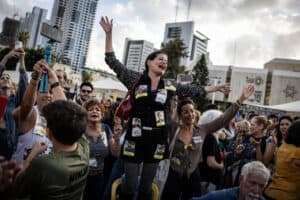Similar hatred and inhumanity must never happen again

A list of names broke the stillness at the Westpark Cemetery on Thursday on Holocaust Remembrance Day at the South African Jewish Board of Deputies (SAJBD)’s annual memorial ceremony honouring the six million people, the majority Jews, killed in the Holocaust.
The names of men, women and children of all ages killed by the Nazi regime were read out by pupils to attendants. The pupils explained each Holocaust victim had a name and a story and that it was important to pay tribute to them, even if it was not possible to tell each one’s story.
Among the list of deceased mentioned was six-year-old Izia Steinberg, from Kyiv, Ukraine; the same area recently shaken by war.
Speaking at the memorial, Lieutenant Colonel William Bergman, chair of the SA Jewish Ex-Servicemen’s League, said that the war raging in Ukraine and the people’s determination to fight for freedom from a violent aggressor was a reminder of the past.

He said one needed to both remember the Holocaust and be vigilant that similar hatred and inhumanity never happened again.
SAJBD Gauteng chair Harold Jacobs explained that each year on Holocaust Remembrance Day, Jewish citizens committed themselves anew to fighting whenever and wherever hateful ideology surfaced.
The ceremony included a presentation by Holocaust survivor Lily Ebert, 98, and her great-grandson, Dov Forman, interviewed by SAJBD vice-president Mary Kluk.

Ebert said she had been stripped of her name in the concentration camps, and instead was given a number by her captors in Auschwitz: A-10572.
Ebert and Forman co-authored the story, Lily’s Promise, which tells her story.
She said of the book’s title: “I promised, if I survived, I will tell the world. I will change the world.”
She related how she had lived in a nice Jewish home with six children, and how she had received a golden angel pendant for her birthday. That angel made an incredible, harrowing journey when Ebert’s family was sent to live in a ghetto in 1944, and one day soldiers arrived and told them to pack their things because they were being sent “to work”.
ALSO READ: Chilling tales of SA’s Holocaust survivors remembered
Her brother advised her to hide the angel as it was made of gold, which she did. She explained to Kluk that this was how the pendant had survived Auschwitz. She held it in her hands as she related her horrific account of Nazis doing experiments on babies, and of an authority at the gates of Auschwitz who, with one gesture, separated the new arrivals to the right (to the crematorium) or to the left.

Other poignant, harrowing stories of courage were shared, including that of sisters Cecilia and Nadia Boruchowitz. Cecilia held onto her passion for music through her entire horrific ordeal.
After the Holocaust, she rebuilt her life and went on to become an accomplished musician. Cecilia’s violin now stands in the Johannesburg Holocaust and Genocide Centre.
Her family is determined to keep Cecilia and Nadia’s story alive.
“These stories must be passed on from generation to generation,” said Jacobs.
Speaking of his great-grandmother’s story, Forman said that he didn’t just know her story – he felt it deep inside.

While the ceremony started with the names of the deceased mentioned, it concluded with another list of names – men and women, soldiers, and authorities who had helped the Jews at a cost to themselves, even of their lives.
Some survivors were also named, and they came to the front, in turn, to light candles by a large Star of David.
The burning candles; the committed gathering; the surviving golden angel pendant; the passionate music of a violin played for memorial guests, following Cecilia and Nadia’s story; demonstrated what Ebert said to Kluk was the most important truth: that there is always hope.
NOW READ: Holocaust survivor Marko Feingold, 104, recalls the Anschluss






